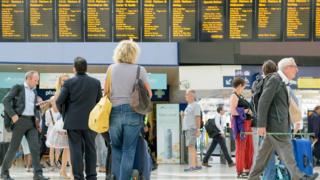Rail timetables overhaul aims to boost frequency and reliability
 Image copyright
Alamy
Image copyright
Alamy
A rail timetable overhaul billed as the biggest in the UK has begun - but it may leave some users behind.
Govia Thameslink Railway (GTR) is rescheduling every train in its franchise, which includes Southern, Thameslink and Great Northern services.
The RMT union says the roll-out is "insulting" to passengers with reduced mobility, who it claims will be left behind if a train is at risk of delay.
GTR said it placed high priority on making its services accessible to all.
From Sunday every schedule for Thameslink, Southern, Gatwick Express and Great Northern trains will be different in an attempt to improve rail efficiency in the South East.
It will mean 400 extra trains a day and new direct services from 80 stations into central London.
GTR has for weeks reminded passengers to plan ahead, check revised timetables and expect their usual services to run at new times.
The train operator does still anticipate delays and minor issues with services as staff and commuters adjust and trains and crew are redeployed.
It has called the shake-up "the biggest-ever change to a rail timetables to significantly boost capacity on the UK's most congested network".
Ahead of the new timetable, the RMT said GTR staff had been given the instructions "Do not attempt to place PRM [Persons of Reduced Mobility] on train if there is a possibility of delaying the service" in a booklet outlining strategies for managing the time trains spend stopped at a station.
RMT general secretary Mick Cash said: "I cannot believe in this day and age we are telling staff to ignore the needs of disabled people if the time it will take to deploy a ramp and assist them onto the train will cause a delay."
Although the rail company did not deny the existence of such instructions, it said: " Our policy remains the same which is to offer assistance to all passengers to help them with their journeys.
"We have a responsibility to make sure each service leaves on time to avoid knock-on delays, skipped station stops and cancellations to other services which would affect thousands of other passengers, many of whom may also be disabled," a GTR spokesperson said.
The timetable changes mean some of the services will be faster and more frequent, while those that that typically suffer chronic delays will be deliberately slowed down to make arrival times more realistic.
Travel journalist Simon Calder said the overhaul would benefit some passengers, such as those travelling from Brighton to London where some rush hour services will be 15 minutes faster.
But he said those journey times are faster because they miss out stops, adding: "If you're one of the people who's waiting on the platform when the train goes through at 90 miles an hour instead of stopping - you're going to be a bit miffed."
GTR is the largest rail franchise in the UK and its commuter services call into London stations such as St Pancras, London Bridge and London Victoria.
It has said the schedule revamp will mean some services to and from commuter towns will be reduced, although total network capacity will increase.
Will you benefit from the new rail timetables? Or do you think the changes will hinder your journeys? Send your comments to haveyoursay@bbc.co.uk.
Please include a contact number if you are willing to speak to a BBC journalist. You can also contact us in the following ways: